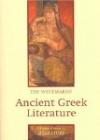
Tim Whitmarsh, Ancient Greek Literature
Cambridge, Polity Press, 2004. 284 p.
- ISBN 9780745627922
- $24.95 (pb)
Recension par Yun Lee Too (New York) dans Bryn Mawr Classical Review 2009.01.33.
Extraits en ligne: amazon.com.
Présentation de l'éditeur:
In this book, Tim Whitmarsh offers an innovative new introduction toancient Greek literature. The volume integrates cutting-edge culturaltheory with the latest research in classical scholarship, providing acomprehensive, sophisticated and accessible account of literature fromHomer to late antiquity.
Whitmarshoffers new readings of some of the best-known and most influentialauthors of Greek antiquity, including Sophocles, Euripides, Herodotus,Aristophanes and Plato, as well as introducing many lesser-knownfigures. Unlike conventional narrative histories, this volume focuseson the profound effects of literature within Greek society.Whitmarsh shows that literature, distributed via a range of socialinstitutions, such as festivals, theatres, symposia and bookproduction, played an important role in the legitimization - andchallenging - of ideologies of gender, class and cultural identity. Thevolume also addresses the legacy of Greek literature: how the Victoriancult of Hellenism and its successors have structured the reception ofancient texts, and how and why the modern West has adopted the Greeksas its ancestors.
This book will be importantreading for undergraduates, in their first year and above, of ancientGreek literature and culture. All texts in the volume are translated,and no knowledge of ancient Greek literature is assumed.
Table des matières :
Preface.
Section one: concepts.
1) 'Greek literature' and cultural history.
2) The problem of tradition.
Section two: contexts.
3) Festival.
4) Symposium.
5) Theatre.
6) The power of speech.
7) Inventing the archive: Athens.
8) Building the archive: Alexandria.
9) Reading from the archive: Roman Greece.
Section three: conflicts.
10) Inventing the Greek.
11) A woman's place.
12) Sexing the text.
13) Status and slavery.
Notes.
Chronology of Greek Literature.
References.
Index of Greek Authors.
General Index.